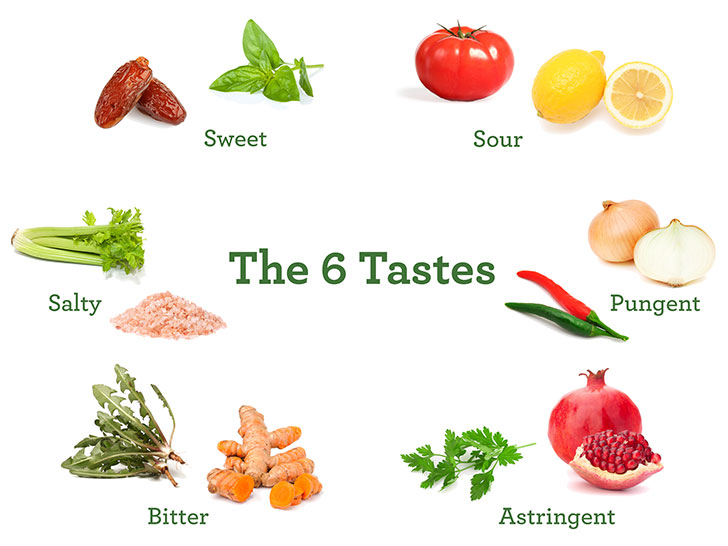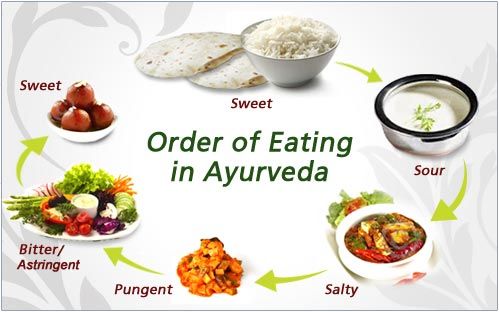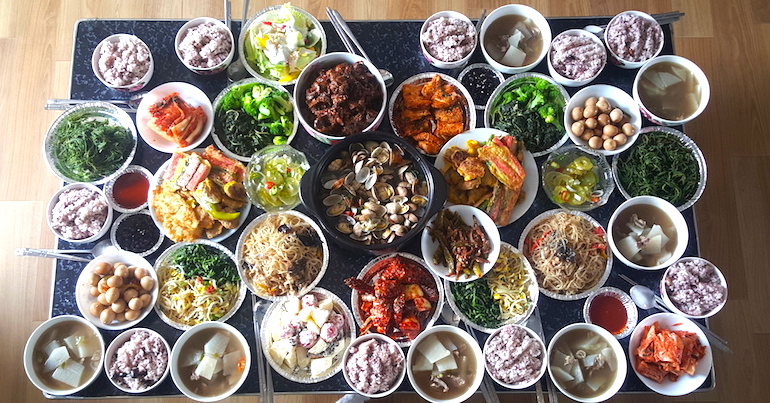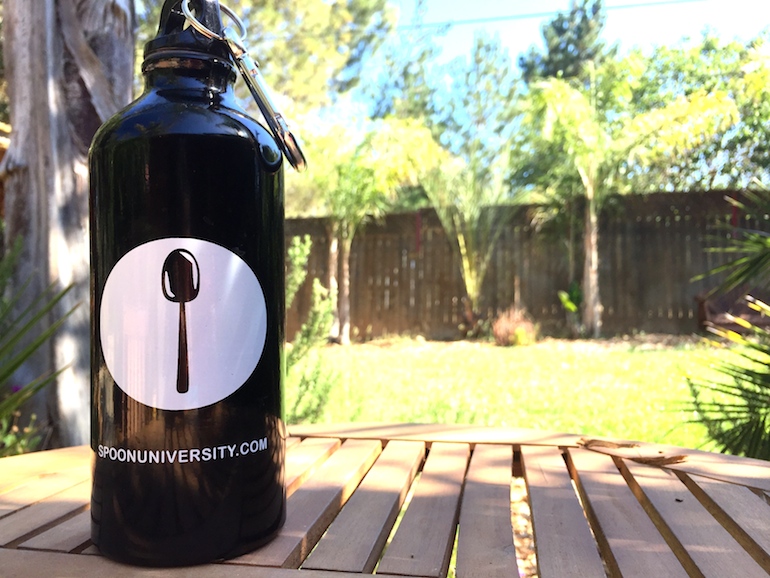Thousands of years ago, the sages of India developed Ayurveda, which continues to be one of the world’s most sophisticated and powerful mind-body health systems. Ayurveda is the ancient Indian system of natural and holistic medicine.
When translated from Sanskrit, Ayurveda means “the science of life.” The Sanskrit root ayur means “longevity” or “life” and veda means “science.” While allopathic medicine tends to focus on the management of disease, Ayurveda provides us with knowledge on preventing diseases and eliminating their root causes so they do not occur.
The best way to prevent diseases is to take care of your health by practicing healthy daily habits. Here are seven of the many healthy eating practices that Ayurveda recommends.
Use the six basic tastes in every meal.

Photo courtesy of banyanbotanicals.com
Sweet, sour, salty, bitter, pungent and astringent are considered the six tastes in Ayurveda. Ideally, you should include these in every meal. A brief description of each of these is given below:
- Sweet or Madhura: Sweet taste has a cooling effect or Virya on the body, and is one of the most nourishing tastes. It works to balance. This is the taste that is nourishing, and that is the reason why it leads to weight gain as well.
- Salty or Lavana: Unlike sweet, it has a heating Virya or effect on the body.
- Sour or Amla: This one leads to a warm effect on the body. When you consume anything which has a sour taste, it stimulates appetite and leads to more saliva production. But, since it is extremely effective, it should be taken only in moderation.
- Pungent or Katu: This one is the combination of air and fire, which is the hottest of all the Rasas. This taste aids appetite, clears sinuses and makes blood circulation better.
- Bitter or Tikta: What needs to be kept in mind is that while it is cooling in the short-term, it is warming for the body eventually.
- Astringent or Kasaya: This one is cool, dry and light. A lot of beans and legumes are astringent in nature, so are broccoli and cauliflower. These may lead to gas for the Vata body type and may also slow down digestion for certain body types, as described in the Ayurveda.
Pay attention to the order of eating.

Photo courtesy of pinterest.com
Ayurveda explains that the digestive process takes place in a certain order. The first food article that gets digested is of sweet taste. So, the sweet phase of digestion is the first phase, followed by sour phase, and then the pungent phase.
Since sweet items take a longer time to digest, Ayurveda explains that we should consume the sweet foods first, and then go for the other tastes. There are many cultures around the world where sweets are eaten first and then the food is taken. Cake first, please!
Eat neither too slow nor too fast.

GIF courtesy of giphy.com
Next up, the speed of eating – just how fast you gulp down those fries also matters. Ayurveda says one should not eat too slow or too fast; one should take the middle path. Eating too slow or too fast will affect the digestive process.
Eat your largest meal at lunchtime.

Photo by Vicky Nguyen
It is believed the digestive fire is at its peak when the sun is at its highest point in the sky (from about 12 noon to 1 pm). The body’s rhythms mirror those of the universe. This does not mean you go for an all-you-can-eat buffet and stuff yourself to the brim. The point is to make your breakfast and dinner meals smaller and easier to digest.
What, when and why you should be drinking water.

Photo by Anasazi Levy
- What: Ayurveda generally recommends drinking warm water. Simply because, for the body to digest cold water, it first needs to be converted into warm water. If not warm water, at least room temperature water is what should be taken.
- When: Drinking water before food is especially recommended for people who want to lose weight. One can drink small quantities of water during meals in order to aid the swallowing process as well as the digestive process, but drinking water after the food is an absolute no.
- Why: Because drinking water after food is extremely detrimental as the body is trying to digest the food that we have just eaten. The fire is trying to burn, and if we pour water right over that digestion fire, the fire will go out. The digestion will get affected and then there will be a cascading effect in the body leading to various diseases.
Eat only after proper digestion.

GIF courtesy of giphy.com
You’ll probably say, “Duh!” Obviously we know that we should eat only when we need the food, but I am one of those people who eat when they feel like it. Here are some signs described by Ayurveda which might help “feely-eaters” like me really know when they are actually hungry:
- Clear belching: Yup, belching is good… but only if it’s devoid of any smell, taste or flavour of the previously-taken food. This shows digestion has taken place.
- Enthusiasm: When food has been digested, you will feel enthusiastic and active.
- Lightness: You will feel your stomach to be light. There will be no heaviness.
- Hunger and thirst: I don’t think I need to explain this one further.
Take it easy and chill… literally.

Photo courtesy of youtube.com
The Ayurvedic approach is about aligning with the infinite organizing power of nature rather than struggling or trying to force things into place. You could also put it this way: “Let the chips fall where they may.”
This principle is embodied by the “Law of Least Effort” (that does not mean you give up and binge eat…). Basically, it’s existing like the nature exists. Like, plants don’t try to grow, they just do; fish don’t try to swim, they just do.
Nature functions with effortless ease, frictionlessly and spontaneously. You will expend least effort when your actions are motivated by love because nature is held together by the energy of love (too cheesy?).
Basically, when your wish to be healthy is just to be healthy and not guided by a short-term motive (though that too is important sometimes) like losing weight for a friend’s marriage or a party or a reunion or to attract someone – that is when you may finally work hard enough to become healthy, because the will to do it comes from inside and not from outside or an external force, this internal force is way stronger than any external force.
It’s like eating broccoli. When you love broccoli, you just eat it, but if you don’t love it you have to make an effort to eat it, nothing and no one in the world can make you eat it.

GIF courtesy of imgur.com
Don’t try being healthy, don’t try living in a healthy manner, but love what you are doing. Love these healthy practices and make them a part of your life not because you have to, but because you want to.




